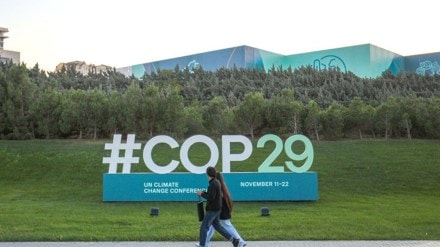By Atanu Biswas
Cop29, the 29th annual global climate summit, is being held in Azerbaijan’s capital, Baku, from November 11 to 22. In Baku, there are notable abstainers. Additionally, apparently the American President-elect Donald Trump is not attending it, but he’s very much there. The return of Trump, who has called climate change a “hoax, con job, and a myth”, at the helm of the White House, complicates negotiations at the COP29, according to experts.
“The election of Donald J Trump is sapping momentum from global climate talks as diplomats brace for his pro-fossil-fuel agenda,” Lisa Friedman wrote in a November 11 New York Times piece. The timing of Trump’s victory and the ensuing world turmoil couldn’t be worse for the planet.
As Trump’s shadow looms at the climate summit, Alix Soliman and Jeff Tollefson attempted to predict what COP29 could yield in an article published in Nature on November 13. Trump labelled the 2015 Paris Climate deal, which governments signed to limit global warming to 1.5-2°C by curbing their countries’ emissions, “horrendous”. He pulled the US out of the deal during his first term in office, in 2017-21. Trump believed that the Paris Agreement was damaging for the US economy. Additionally, he halted American contributions to a global climate fund. The next government, however, reversed the decision, and on his first day in office in 2021, Biden reinstated American participation.
John Podesta, who is now leading the Biden administration’s delegation at the annual talks, stated, “Efforts to prevent climate change remain a commitment in the US and will confidently continue,” despite the possibility of the US federal government putting climate-related actions on the back burner under Trump’s leadership. But as one might think, Biden administration representatives in Baku are now lame ducks and have little leverage over any agreement.
In order to profit from more American oil and gas, Trump is ready to bring back his “drill baby, drill” policy. According to the President-elect, America has “more liquid gold than any country in the world”. Although not all experts agree, he believes that allowing oil drilling in places like the Arctic wilderness will reduce energy costs.
Trump’s transition team has prepared a number of executive orders and proclamations, according to the New York Times. These include closing all offices in every agency that is working to stop pollution that disproportionately affects impoverished communities, and also withdrawing the US from the Paris Agreement. Although the exit process will only take a year this time, experts argue that the harm has already been done in many respects.
Overall, these indicate that the US will abandon its pledge to reduce greenhouse gas emissions at the exact moment when scientists advise countries to drastically and quickly reduce heat-trapping pollution to prevent the worst consequences of an overheated planet. Additionally, it means that the world’s richest nation is probably going to back out of plans to provide financial assistance to developing nations that have contributed little to global warming but are struggling to deal with increasingly catastrophic climate disasters.
The US approved the historic 2022 Inflation Reduction Act, a climate change law, under the Biden administration, investing at least $390 billion in the production of wind, solar, and other clean energy. Trump reportedly wants to overturn the programme, but given that roughly 80% of the investment in new manufacturing has so far gone to Republican congressional districts, that could be politically difficult for him also.
Many campaigners view Trump’s impending rollbacks as a death sentence for our planet since they might result in an additional 4 billion metric tonnes of carbon dioxide emissions into the atmosphere by 2030 if Biden’s policies are continued. According to a University of Maryland report in September, non-federal entities such as states and cities can reduce emissions by 48% by 2035 if Biden administration climate laws and policies are repealed. This is less than the prior US commitments to reduce greenhouse emissions by at least 50% from 2005 levels by 2030.
The US choosing to take a backseat could go in a number of ways. It will be very difficult to negotiate a robust agreement without the US, the world’s largest economy and its second-largest emitter of greenhouse gases. In fact, the impact is already evident.
For instance, the Argentine negotiators who were representing President Javier Milei’s government have been ordered to withdraw from COP29. Milei, Argentina’s far-right leader, has previously claimed that the climate problem is a “socialist lie”. During last year’s presidential campaign, he made threats to back out of the Paris deal and has since backed down. With Trump’s re-election, he’s now back in action.
Countries are expected to look for ways to raise the enormous amounts of money required to address the climate catastrophe at the COP29 UN climate summit. By 2035, developing nations hope to receive $1 trillion annually in funding guarantees to help them reduce greenhouse gas emissions and prepare for the effects of extreme weather. The COP29 climate finance aim, however, may turn out to be way off.
Many, however, believe that a single election outcome won’t cause the Paris Agreement to collapse. Trump’s re-election may also inspire a renewed sense of solidarity among other leaders, maybe forming a coalition that agrees to a significant financial step for developing nations. Although the Trump campaign pledged to withdraw the US from the Paris Accord, China seems more determined than ever, according to a November 11 WSJ piece by Matthew Dalton. According to many, the Paris Agreement has survived one Trump presidency and will survive another.
A shade of uncertainty remains, though.
The writer is Professor of statistics, Indian Statistical Institute, Kolkata.
Disclaimer: Views expressed are personal and do not reflect the official position or policy of FinancialExpress.com. Reproducing this content without permission is prohibited.
